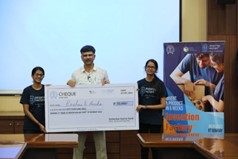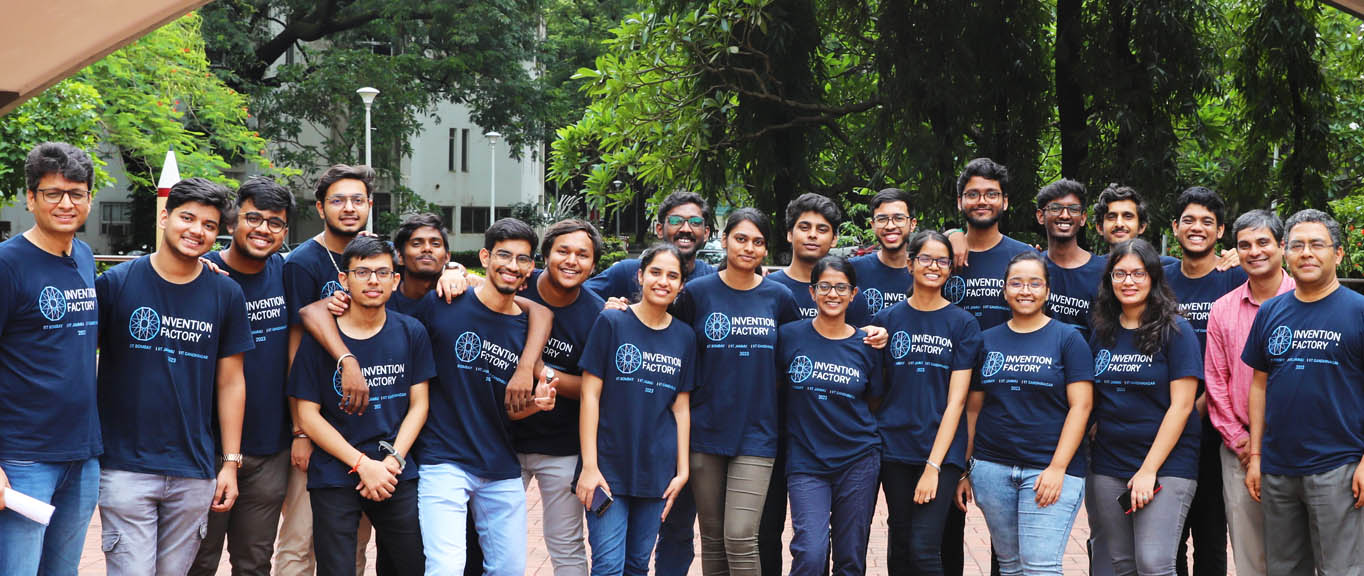Students from the IITs and NITs all across India came together for six weeks where they ideated, prototyped, and pitched their innovative products that address critical societal and consumer needs to an illustrious panel of judges.
And on July 7, 2023, the Invention Factory Program crowned its top three winners!
First Prize:
Chirag Sathpathy from NIT Trichy and Rahul Kumar Singh from IIT Gandhinagar placed first and won Rs. 2 lakhs for their innovative prototype that checks for gas leaks with an Automatic Gas Shutoff Knob.

Second Prize:
Akansha Saini from IIT Jammu and Bhavana Mohingi from IIT Bombay came second and won Rs. 1 lakh for their innovative prototype on Evaporative Cooking And Water Filtration.

Third Prize:
Anika V. Thayyil and Roshni S. – both from IIT Chennai created a prototype of an Induction Stove Adapter that adapts flat induction stoves for cookware with curved bases and placed third in the competition. They won a cash prize of Rs. 50,000.

The Birth of Invention Factory in India
Organized by the American-based non-profit organization, the Maker Bhavan Foundation (MBF), the IF program was originally launched in India in 2018 at IIT Gandhinagar and subsequently moved on to IIT Bombay in 2022 and kickstarted at IIT Jammu in 2023. Speaking about the need for a program such as the IF, Damayanti Bhattacharya, CEO, MBF, said that since students in India have a solid background in core sciences during their grades 11 and 12, the first few semesters at their engineering college is not as exciting. Getting them involved in an innovation-based program like IF (which is seldom featured as part of their course material) challenges students to innovate essential products and allows them to make a tangible impact on the world around them.
The 2023 iteration of IF at IIT Bombay saw significant growth in interest levels from students across the country. IIT Bombay hosted 60 talented students (as opposed to 40 in 2022) and had them work with each other in teams of two. What differentiates IF from other similar student-driven programs is the ability of the student teams to present their ideas and thought processes to an esteemed panel of guest evaluators every week. This is unlike other programs where only the finished prototypes are presented at the end without any scope for improvement while the products are being developed.

The Many Innovations of Invention Factory 2023
Apart from the prize-winning products, the teams at IF 2023 developed other extraordinary products like urine tests, anti-fogging masks, and more.
Students went through a rigorous process to come up with their final products to showcase at the finale. During their first week, students spent time identifying like-minded participants to team up with and then worked with faculty members to identify a core societal problem to work on. Prof. Chandra Sekhar Yerramalli from the Department of Aerospace Engineering, IIT Bombay, said that the struggle to identify and frame a problem statement was very real. “There was much discussion and questions which ultimately led to ideas and solutions,” he said. Students also learned how to create the ideal problem statement and learn about patent laws before beginning to work on building their prototypes.
Students learned how to search for existing patents to ensure that they weren’t working on a product that had already been invented and patented.
Professor Nishant Sharma of the School of Industrial Design at IIT Bombay added that the inventions that come out of IF can be varied and diverse. “Some inventions can save lives; some may help disabled people walk; some may be gadgets for the home or kitchen,” he explained.
This year, some of the other critical prototypes that resulted from IF include:
- Sharanya Garg, a second-year B. Tech. student from IIT Madras and her teammate Pratham Mishra, also a second-year B. Tech. student from IIT Kharagpur created a prototype for a Manual Urine Testing Device.
- Manas Agrawal from IIT Gandhinagar and Yuvraj Chugh from IIT Jammu created a prototype of a lightweight, economical extension that can convert regular sports shoes into gum sole shoes that are mandatory for playing badminton.
- Saraswat and his teammates built a Twistlock Spanner Enhancer that prevents the rotation of nuts and bolts in the same direction.

Other Life Lessons and Skills Learned During Invention Factory 2023
Whether their prototypes won or not, over the course of six weeks all of the teams learned invaluable life lessons.
- Students like Samyukta Kagdelwar, a 4th-year student of Ocean Engineering and Naval Architecture at IIT Kharagpur, and her teammate Kushagra Chindak, a 3rd-year student of Mechanical Engineering at IIT Bombay learned that while ideas may be brilliant – the time frame of six weeks to create a working prototype is not feasible.
- Others like Roshini S from the Engineering and Design Department, IIT Madras – and subsequent winner – realized that their initial ideas were not commercially viable.
- Shreyansh Saraswat, ME student at NIT Hamirpur, and Kshitij, Department of Electrical Engineering, IIT Jammu, had their prototypes rejected repeatedly because they were not efficient. But they worked hard on their prototypes and eventually made one that the judges approved of.

The six weeks program also imparted many new skills that students did not have before. Most of them had stage fright and were not well versed in the art of making presentations to an august group of judges and faculty members. Others did not have the skill set to handle design models and designing software to create their prototypes.
“The IF offers what a traditional B. Tech. program typically doesn’t. Which is to push students to think and come up with solutions along with questions,” said Prof. Yerramalli. “It forces students out of their disciplinary silos as they must address every aspect of their product. For instance, the group making a switchboard has to see every element including electrical, mechanical, features, accuracy, and others. This is the opportunity for them to look at a problem as a problem and not from the perspective of an engineering branch.”
Both Prof. Yerramalli and Sharma concur that programs like IF are mandatory for students as they allow them to get out of their classroom mindset and participate in real-life issues and help find satisfactory resolutions to them.
IIT Bombay is very proud of ALL of the exceptionally smart and driven participants of the Invention Factory 2023. Every one of the 60 students – over the six weeks – showcased their outstanding creativity and problem-solving skills and offered tangible solutions to real-life and societal challenges. Their prototypes are a testament to the power of young minds and what they can accomplish when allowed to channel their knowledge and passion toward building a better future. With their groundbreaking inventions, these students have shown us that they are not just remarkable innovators but also catalysts for positive change. These dynamic students are an inspiration to all of us as they show us how to embrace the potential within us to make a meaningful impact on the world.

